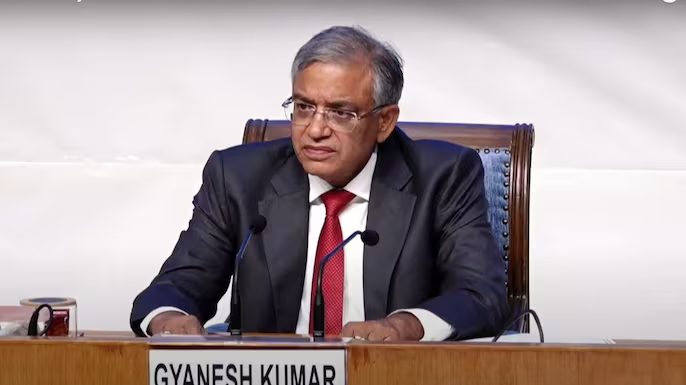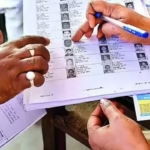Fall of Democracy’s Last Bastion: Election Commission as the BJP’s Strategic Shield
Post the 2024 Lok Sabha election – where Narendra Modi narrowly lost power – the subsequent state elections in Haryana and Maharashtra delivered astonishing results. Even during the general election itself, there were already visible signs of manipulation in several constituencies. A year earlier, in March 2023, the Modi government had enacted the Chief Election Commissioner and Other Election Commissioners (Appointment, Conditions of Service and Term of Office) Act, 2023.
This law dismantled the appointment mechanism laid down by the Supreme Court, which required a selection panel consisting of the prime minister, the leader of the opposition, and the chief justice of India (CJI). The new Act removed the CJI from the panel, replacing him with a Union Cabinet Minister nominated by the Prime Minister – thereby handing the executive near-total control over the appointment of Election Commissioners. The law came into force on January 2, 2024 and ominously set the stage for the troubling developments witnessed in the elections that followed.
The immediate trigger for the Supreme Court’s earlier intervention was the bizarre appointment of Arun Goel. A 1985-batch IAS officer, Goel abruptly took voluntary retirement on 18 November 2022, and was appointed Election Commissioner the very next day – a startlingly swift and opaque process that raised questions about pre-selection and lack of transparency.
His tenure was equally curious: in March 2024, just before the Lok Sabha polls, he resigned without offering a convincing explanation. His subsequent appointment as India’s Ambassador to Cyprus only reinforced the impression that the position of Election Commissioner had been reduced to a transactional bargain, with loyalty rewarded instead of institutional integrity safeguarded.
This chain of events underscored how the Modi government has systematically eroded the autonomy of institutions entrusted with safeguarding democracy. The Election Commission – once respected as a model of neutrality – appeared increasingly pliant to the will of the executive.
Goel’s case laid bare how constitutional positions could be bent to serve partisan objectives, reducing the Commission to an instrument of the ruling dispensation rather than an independent check on its authority. Such manoeuvres not only corrode public trust in the electoral process but also point to a deeper decay in democratic accountability itself.
After the 2024 Lok Sabha elections, the Congress repeatedly voiced suspicions of electoral irregularities, citing patterns that appeared far from ordinary. Across several constituencies, discrepancies in voter rolls were reported – eligible names were found missing while dubious entries were allegedly retained. In a number of seats, Bharatiya Janata Party (BJP) victories came with strikingly narrow and suspiciously uniform margins, even in constituencies where Congress and INDIA bloc candidates had been expected to perform strongly.
Rahul Gandhi and other Congress leaders further charged that the Election Commission had abandoned its neutrality, failing to act on opposition complaints and dismissing them without adequate inquiry. They also pointed to the Commission’s refusal to expand VVPAT slip verification despite persistent demands, a decision that deepened doubts over the integrity of electronic voting machines.
Post-2024 Lok Sabha elections
The Haryana Assembly elections of October 2024 were overshadowed by serious suspicions of irregularities. Despite palpable anti-incumbency sentiments and widespread rural discontent, the BJP managed to secure an unexpectedly strong performance – an outcome that many in the opposition and independent observers struggled to reconcile with ground realities.
Allegations of manipulated voter rolls, dubious postal ballot trends, and unusually inflated margins in select constituencies further fuelled doubts about the fairness of the process. Compounding these concerns was the Election Commission’s opaque handling of data, marked by delays in releasing constituency-level details and its reluctance to investigate complaints raised by opposition parties.
Taken together, these factors deepened public scepticism and created a widespread perception that the electoral machinery had been tilted in favour of the ruling party, eroding confidence in the sanctity of Haryana’s verdict.
If Haryana raised troubling questions, the Maharashtra Assembly elections that followed immediately afterwards delivered perhaps the most startling political reversal in recent years. Barely five months earlier, in the 2024 Lok Sabha polls, the BJP had faced a humiliating setback in the state, winning only 17 of 48 seats while the INDIA bloc swept the majority. Yet in the Assembly elections, the results were dramatically inverted.
The BJP–Shiv Sena (Shinde) alliance registered an unexpectedly commanding performance, defying both the recent parliamentary outcome and pre-poll forecasts. What baffled observers even more was the air of unshaken confidence displayed by Devendra Fadnavis throughout the campaign. Despite the evident anger reflected in the Lok Sabha results, he repeatedly asserted that the BJP would return to power with ease – almost as if he already knew the outcome. When the results were declared, they stunned not only political analysts in Maharashtra but also the wider national audience, fuelling fresh suspicions about the integrity of the electoral process.
These back-to-back verdicts, delivered within the span of a few months, were too stark to be dismissed as ordinary shifts in voter preference. In the general election, the electorate had clearly rejected the BJP, yet in the state elections, the same voters ostensibly swung back in its favour. This dramatic reversal not only defied logic but also eroded public trust in electoral credibility.
The dissonance gave rise to widespread murmurs of manipulation, with opposition parties alleging that the Election Commission had failed in its duty to ensure free and fair polls. For many, Maharashtra became a case study of how the BJP, once vulnerable to electoral defeat, may have consolidated itself through its tightening grip over the electoral machinery.
The EC’s unbecoming behaviour
In the Maharashtra Assembly elections, suspicions of large-scale manipulation intensified when it emerged that there had been an abnormal increase in registered voters and, more glaringly, an incredible surge in polling after the official closing time of 6 p.m. Election experts categorically stated that such a volume of votes could not have been cast within the limited time available, raising serious concerns of malpractice.
The Congress demanded explanations and access to the mandatory videographs of polling booths –recordings meant precisely to ensure transparency during extended voting hours. Yet Chief Election Commissioner (CEC) Rajiv Kumar flatly refused to share the footage. At a press conference, he dismissed Congress’s demand with the bizarre claim that it would take “3,600 years” to examine the videos.
This cavalier response, delivered in a tone indistinguishable from that of the BJP, mocked the opposition’s concerns and starkly revealed the Commission’s abdication of its constitutional role as an impartial authority, reinforcing the perception that it had become an instrument of the ruling regime.
Similar concerns arose during the Karnataka Lok Sabha elections. In the Bengaluru Central constituency, where the Congress candidate initially held a decisive lead, the BJP eventually prevailed after an unusual spike in voting numbers in its Mahadevpura segment. When the Congress sought access to the digital electoral rolls, the EC flatly refused, providing only paper rolls that were nearly impossible to examine at scale.
Rahul Gandhi personally took interest in the matter, commissioning a six-month investigation by his team. The findings were damning: of the 1,00,250 suspicious entries identified, 11,965 were duplicate voters (registered in multiple booths, sometimes across states); 40,009 carried fake or invalid addresses (including house numbers like “0” or nonsensical strings); 10,452 were bulk registrations, with dozens of voters crammed into single-room homes or even businesses such as a brewery that “housed” 68 voters; 4,132 carried invalid or unrecognisable photos; and 33,692 appeared to reflect misuse of Form 6, including implausible registrations of very elderly individuals, even nonagenarians.
Some examples bordered on the absurd, yet they were incontrovertible. The BJP ultimately won Bengaluru Central by a margin of 32,707 votes – decisively aided by its margin of 1,14,046 in Mahadevpura, even though Congress candidates had led in all the other six segments of the constituency. Mahadevpura was just one example; similar manipulations were suspected elsewhere. Yet, when the Congress again pressed for the digital rolls to enable a meaningful investigation, the EC refused outright.
If Rajiv Kumar’s conduct was questionable, his successor, Gyanesh Kumar – the first Election Commissioner appointed under the Modi government’s controversial new Act – took partisanship to a new low. On February 19, 2025, when a delegation of opposition parties sought to meet him, he not only kept them waiting for hours but also refused to meet the full group, allowing only one representative from each party. The meeting quickly turned acrimonious, forcing the delegation to brief the press outside Nirvachan Bhavan. His behaviour, high-handed and dismissive, was widely seen as abominable and utterly unbecoming of a constitutional authority, further undermining the Election Commission’s credibility.
Misleading responses of the CEC
The Chief Election Commissioner’s press conference, convened to refute Rahul Gandhi’s claims, ended up exposing the Commission’s own frailties. His explanations were neither credible nor technically sound, and would hardly convince any reasonable observer – let alone those familiar with data systems.
The Election Commission has a clear responsibility to ensure the integrity of electoral rolls through systematic checks. In an era of computerised databases, de-duplication based on parameters such as name, address, age, or Aadhaar linkage is not technically complex. The continued presence of duplicate entries and anomalous records, therefore, can only mean one of two things: either the Commission does not employ such tools at all – an egregious dereliction of duty – or it deploys them selectively, allowing irregularities to persist, which points to partisan intent.
In both cases, the Commission’s conduct is indefensible. Instead of acknowledging these lapses, the CEC attempted to normalise them, misleading the public into believing that the electoral rolls remained intact when in reality they stood compromised.
The question of video footage is equally straightforward. The government’s rule mandating deletion of polling booth recordings after 45 days amounts to nothing less than the deliberate destruction of potential evidence. In the age of big data, preservation of such records is neither technically difficult nor resource-intensive. A conscientious Election Commission, aware of its constitutional duty, would insist on retaining this material until at least the declaration of the next election results.
By failing to do so, the Commission not only weakens transparency but also aligns itself with the government’s political interests – when, in fact, it is the government that ought to be held in check by constitutional bodies, not the other way around. A person that does not grasp this elementary principle has no business occupying such a critical post.
Equally untenable is the defence that errors in the voter rolls are inconsequential because booth-level checks would prevent fraudulent votes. This argument is both flawed and dangerous. Booth-level mechanisms, while appearing foolproof in theory, are highly vulnerable in constituencies where the ruling party faces serious electoral threat.
Duplicate or fraudulent entries in the rolls provide a ready reservoir of phantom voters that can be mobilised on polling day. With the collusion of presiding and returning officers, such fraudulent identities can be activated, and ballots cast in their name. What is projected as a safeguard thus becomes the very conduit for electoral manipulation, striking at the heart of democratic credibility.
EC’s partisan role as an agent of the BJP
The Election Commission’s partisan role as an agent of the BJP is most starkly revealed in the controversial Special Intensive Revision (SIR) of electoral rolls currently underway in Bihar. Instead of taking opposition parties into confidence, the EC has chosen to fight them tooth and nail in the Supreme Court, defending an exercise riddled with flaws.
As of now, nearly 65 lakh names have already been deleted from the voter rolls, and activists fear the figure may ultimately cross 10 million. Most of those struck off belong to the lower strata of society –communities for whom deletion from the rolls means not only disenfranchisement at the ballot box but also the loss of ration cards and other welfare entitlements tied to citizenship records.
Why would the EC undertake such a dubious and destabilising project? There is no plausible explanation except that it is executing the BJP’s political strategy. After the shock setback in the 2024 Lok Sabha elections, the BJP appears determined to insulate itself from the risk of electoral defeat. It has effectively captured the Election Commission, ensuring that regardless of how people actually vote, the institution will tilt the scales in its favour.
This is the grim reality we face: the EC is the final authority to declare election results, and if it does so irrespective of the people’s mandate, the BJP will never be dislodged from power in normal course. In such a scenario, what remedy would remain for the people? It is time, perhaps, to begin composing a requiem for Indian democracy.








